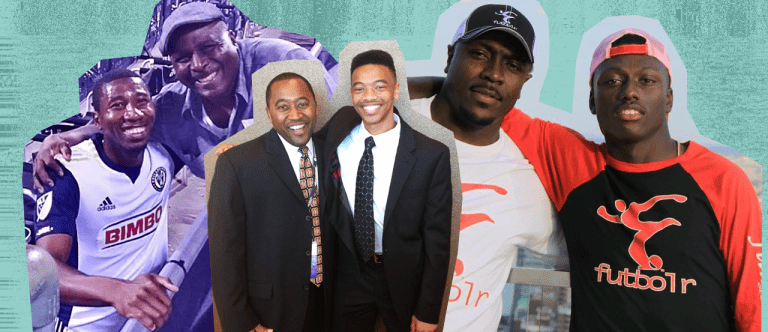
Whether it's marching in the streets, using their platform to educate and inspire or banding together to launch the Black Players Coalition, Black players across MLS are standing up and speaking out in the wake of George Floyd's murder, and the difficult but essential conversations it has sparked in the United States and around the world.
So this year MLSsoccer.com is commemorating Father’s Day by asking several players how their fathers prepared them for the challenges ahead, and helped them find success and fulfillment in both soccer and life. Here are a few of their stories.
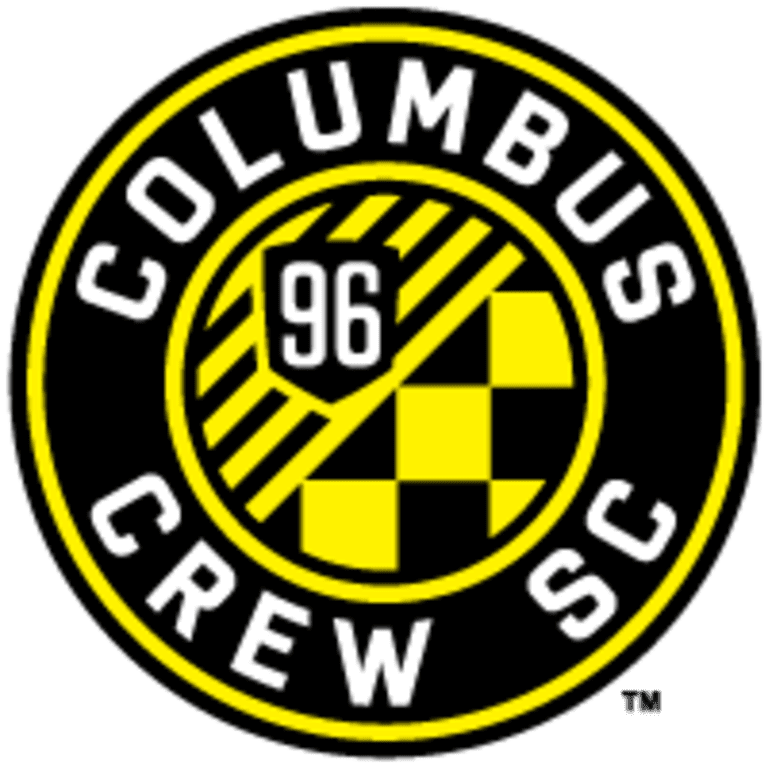
Derrick Etienne Jr.
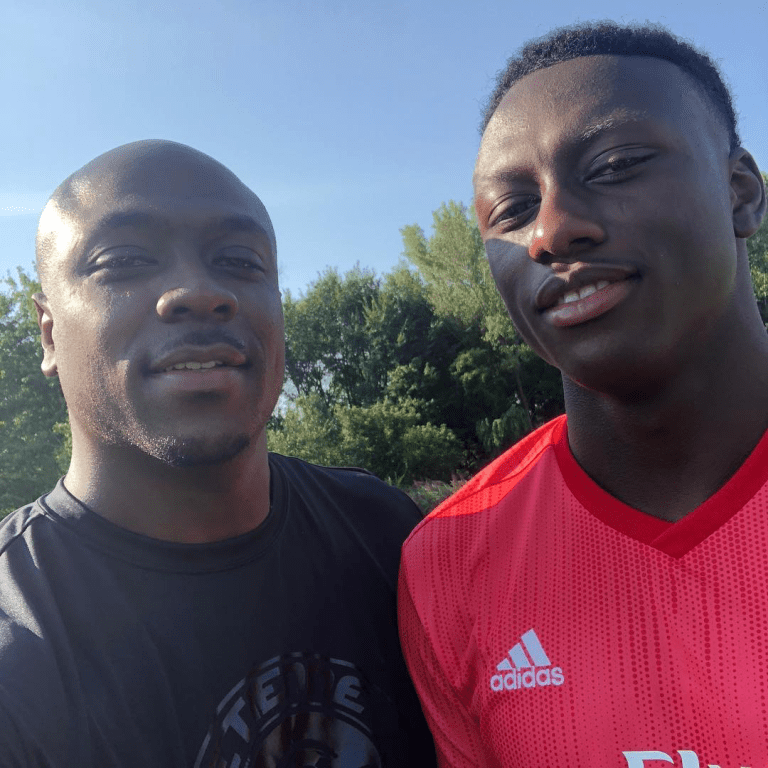
Derrick Etienne Sr. and Jr., respectively | Courtesy of Etienne family
In many Black families, conversations about how to safely navigate interactions with law enforcement are an adolescent rite of passage. But the Crew SC attacker got a frightening introduction to the topic even earlier, at age 10, when his father was pulled over by police as he drove Derrick Jr. back to their home in northern New Jersey after soccer practice.
"I think my dad had the car in my grandmother's name, and the guy didn't believe that my dad did, that my grandmother was who he said she was," remembered Derrick Jr. in a conversation with MLSsoccer.com. "My mom had to come out and pick us up, because they ended up taking the car away and just leaving us out there on the side of the road. That was my first real interaction with the police."
The incident led his parents to give him a detailed rundown of rules to follow around police, which he's had to put to use all too often. Always be aware of your surroundings. Try to be as polite as possible. Give them space. No sudden movements. Tell them what you're going to do before you do it. No arguments. And above all, do what’s necessary to make it home safe.
It’s an unpleasant but unavoidable legacy for a family that would much rather pass down soccer from one generation to the next. In their day Derrick Sr. and his twin brother Darrell were professionals and Haitian internationals, taught by their father Fritz, a promising player in Haiti before he emigrated to the United States at age 18 with $19 in his pocket in search of a better life.
Derrick Jr. and his younger sister Danielle are both standout players who’ve already represented their ancestral homeland at the international level. Darrell’s son Omre is a 17-year-old prospect in the same New York Red Bulls academy system that groomed Derrick Jr., and other talented cousins and uncles abound. Derrick Jr. traces his own pro ambitions back to watching his dad lead the Long Island Rough Riders to a USISL championship with an MVP performance in 2002.
"He won a national championship and I was in the stands, and he won MVP. That kind of just changed everything for me," he explained.
"He’s done an amazing job molding me into the man I am today," Derrick Jr. says of his namesake. "Definitely growing up where I grew up, I could have ended up a totally different person. So for me to be in the situation I’m in and things that I am, I owe it to him and my mom."

Raymon Gaddis
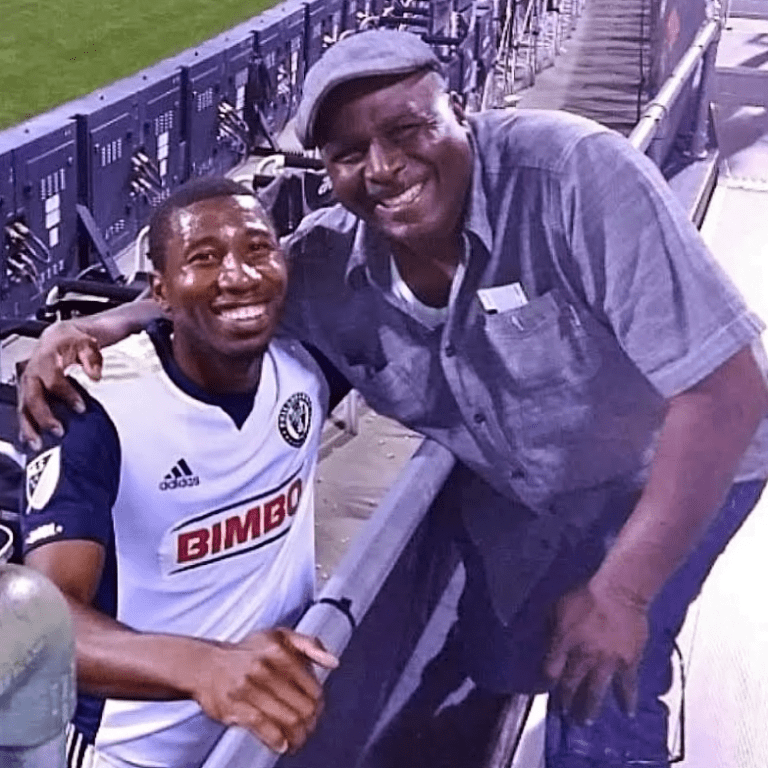
Ray and Ricky Gaddis | Courtesy of Gaddis family
Philadelphia’s veteran fullback was raised in a long family tradition of faith and he remains a devout member of the Church of God in Christ, whether he’s catching Sunday services in Philly or back in his hometown of Indianapolis. And when Gaddis’s team, be it the Union or during his college days at West Virginia, swing through for road matches in Cincinnati, Chicago or anywhere else in reasonable driving distance of the Hoosier State, his father Ricky is liable to show up with a busload of extended family members.
Literally.
"My family is very supportive. We're a very close-knit family," Gaddis told MLSsoccer.com. "I think I have a picture on social media, where there's anywhere from 20 to 30 relatives coming to see a game vs. Chicago Fire.
"So if one person is doing something in our family, you're going to see a massive gathering of our family members in different capacities, it doesn't matter if it's cousins, great aunts, uncles, mothers, grandmothers, second cousins – you’re going to see relatives at the games. He makes sure that our family supports one another. That’s just the man that my dad is."
Gaddis recently earned his minister’s license, continuing a proud family tradition, and he puts his values to work by serving meals to the homeless and taking to the streets to march in support for equality and justice in the wake of George Floyd’s murder. Just like Etienne, he was also taught early on that for Black men in particular, even the most innocuous encounters with police officers need to be handled with caution.
"My dad did not sugarcoat different things, or different hurdles that I would have to leap over, or things that I would have to dodge," Gaddis told MLSsoccer.com. "I believe because of the things that he's instilled in me, it's allowed me to handle things with grace. This George Floyd situation very well could have been myself."
He credits both his father and grandfather as his role models in this regard.
"I look to them as an example of how to conduct myself, no matter the situation."

Mark McKenzie
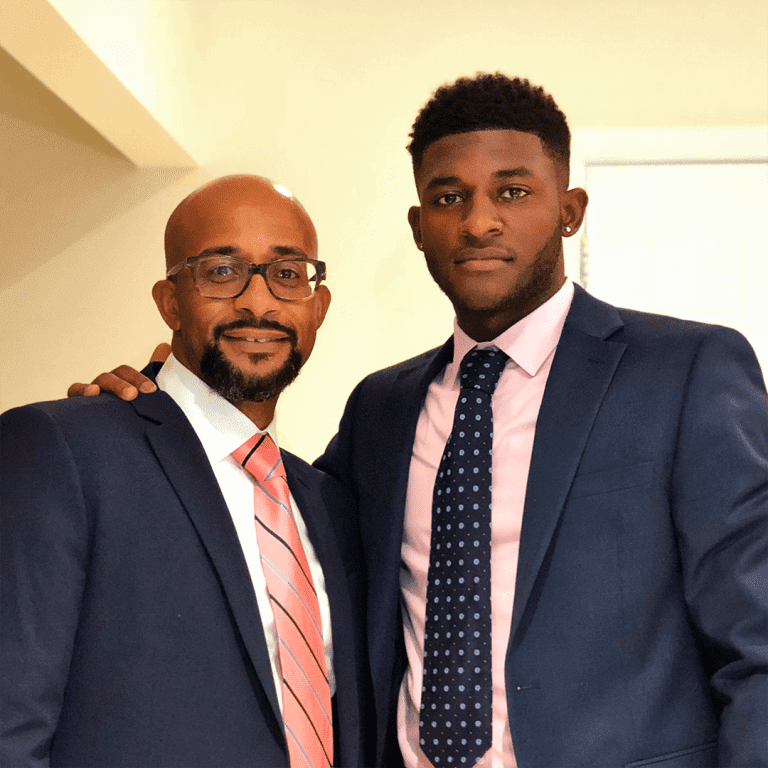
Mark McKenzie (right) with his father "Big Mark" McKenzie (left) | Courtesy of Mark McKenzie
McKenzie’s father is also named Mark, and he too was a talented player in his day, emigrating from Jamaica to the Bronx and playing right back for Hunter College before moving into a long and successful career as an educator. "Big Mark" was also his son’s first coach, and the Union’s Homegrown center back traces his own soccer achievements back to the sturdy foundation laid in those early years.
"He allowed me to fall in love with the game," McKenzie said. "I think the biggest thing for me that he passed down to me was just enjoying it, having fun playing the game … ultimately that’s what gets you through the difficult times, and that’s what keeps you flying in the good times."
When the family moved south to Delaware in 2003, it set the stage for the younger Mark’s path into the Union’s respected youth system. Current first-team boss Jim Curtin, back then an academy coach, was among those who spotted McKenzie’s potential and the defender joined YSC Academy in 10th grade, setting him on his current course. McKenzie credits his dad for who he’s become, not only as a player but as a person.
"He’s my biggest role model. I’ve been looking up to him and how hard he works in everything he does, how much passion he puts into whatever he sets his mind to," said McKenzie, who has added his voice to the conversation about race and privilege unfolding across MLS this summer. "That’s something that I’ve carried in my life, how much he's dedicated and sacrificed to put me in the position where I am today.
"He’s the reason why I am so outspoken. He taught me to speak my mind when appropriate, and with respect, but with great pride in who I am and with great humility to speak up for those who may not necessarily be on the same platform or have the same opportunities as myself, and make sure that their voice is heard as well."
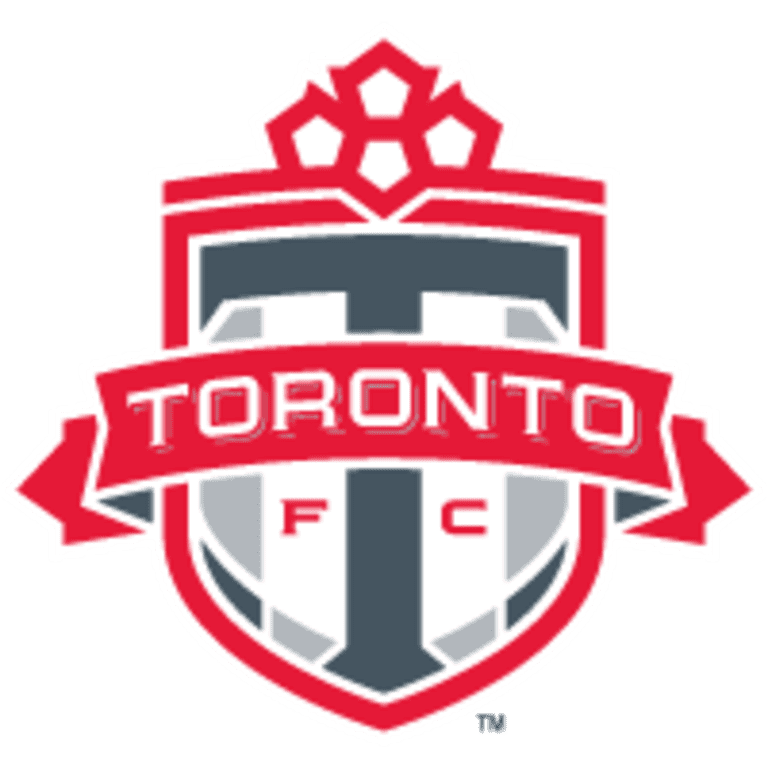
Richie Laryea
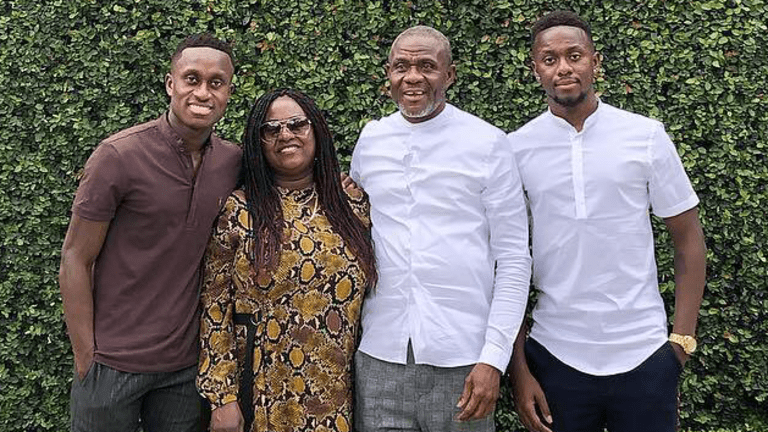
Richie Laryea (left) and his father Robert (center) with family | Courtesy of Richie Laryea
Toronto FC’s rangy fullback is very happy to be playing in his hometown after stints south of the border at the University of Akron and Orlando City – and so are his parents Robert and Cynthia.
On June 3 Laryea wrote movingly of his mom calling him every night he lived in the United States to make sure he was being safe and careful in a country where gun violence and heavy-handed law enforcement treatment of Black people has become a national crisis. And his father, who emigrated from Accra, Ghana with just a few dollars in his pocket and carved out a living before before bringing Richie’s mother and sister to Canada, made sure his teenage son was prepared when he went off to college.
"We speak about things like this pretty frequently, especially leading up towards me going to school in the States to play for University of Akron," Laryea explained. "Me and him had many, many conversations of what it was like there, because I think with me being younger, I was a little bit naive to what was really happening in the States and all the racism and police brutality and all those types of things.
"My dad helped me a lot to understand, unfortunately, how to act and how to maneuver and what to do, what not to do when I'm with certain people, certain crowds, around police officers," he added, before noting that "not always is that even helpful, because we've seen situations now that people are still being killed and they're complying with officers."
Richie also leaned on his dad while enduring a frustrating time with Orlando that had him contemplating hanging up his boots altogether before he earned a contract with TFC a year ago, and he looked back on his parents’ incredible sacrifices as immigrants to find inspiration to keep grinding. He’s a father now himself, and appreciates more than most the chance to have three generations of the Laryea clan at BMO Field for home games.
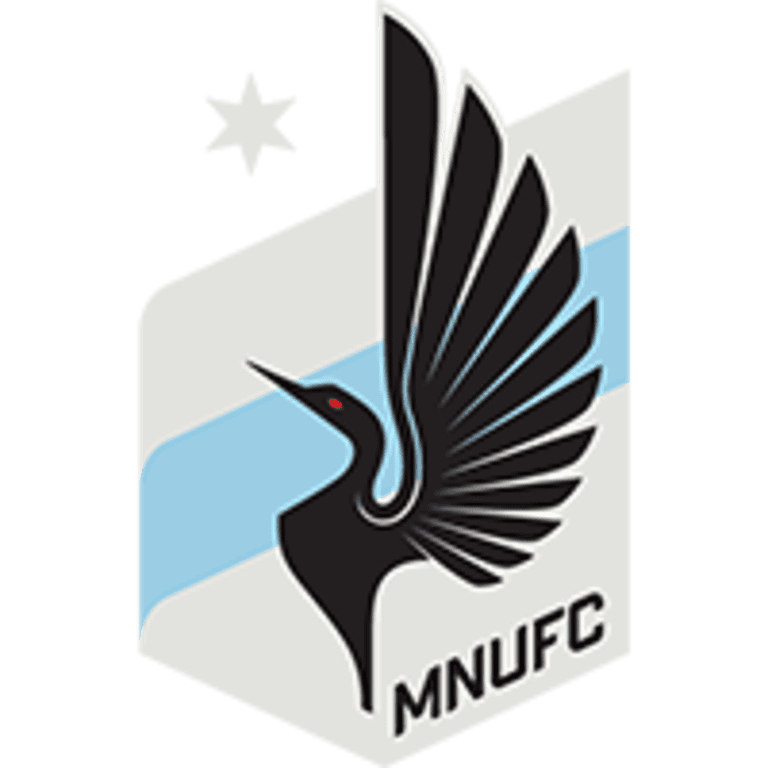
Jacori Hayes
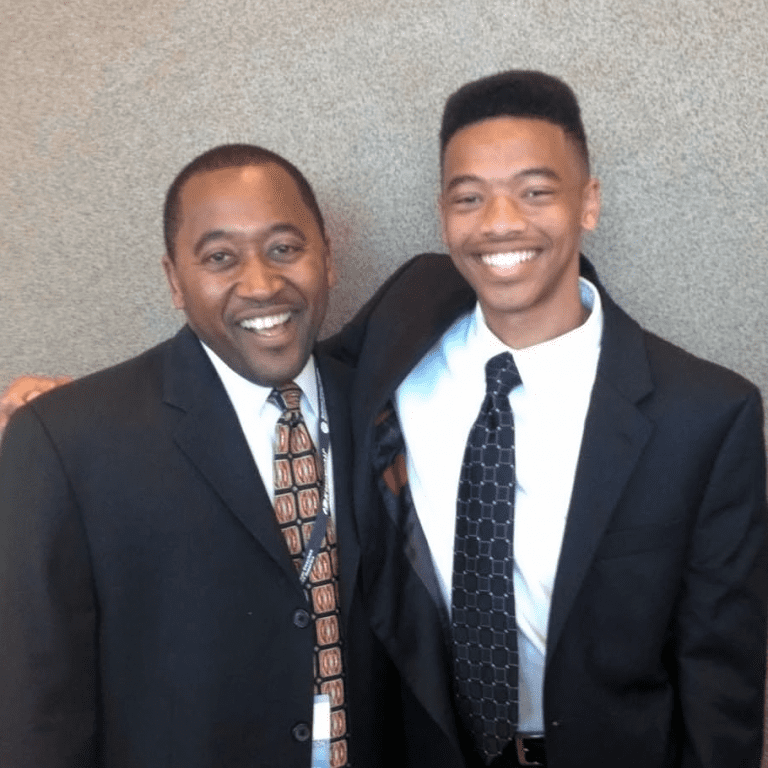
Reggie and Jacori Hayes | Courtesy of Jacori Hayes
The Loons’ Maryland-reared midfielder didn’t grow up in a soccer household.
His father Reggie also enrolled him in a variety of activities like basketball, baseball and gridiron football before he settled on the beautiful game in his early teens, and didn’t pretend to have expertise in Jacori’s chosen craft. But dad knew enough to administer some real talk when it was needed, early in his son’s rise from a local Under-9 travel team called the Free State Red Devils to AC Bethesda to the Baltimore Bays’ U.S. Soccer Development Academy squad.
"I remember we had a talk after one practice, he was like, ‘I don’t think you're going to be cut out to play at the higher levels. It seems like everyone else around you is just better than you,’" recalled Hayes to MLSsoccer.com. "He’s not a soccer person, but he has a trained eye in sports and he could apply what he knows from other sports into soccer. I didn't want to admit it at the time, but after digesting it for a couple of days I knew 100 percent that he was right and it forced me to work harder."
Reggie and his wife Valerie did not hesitate to haul Jacori on 90-minute round trips along the I-495 Beltway and up and down the Baltimore-Washington Parkway five times a week for his practices and games – "it was a nightmare traffic-wise," admitted Jacori – even as they did much the same for the various activities of his siblings Carmyn, Camber and Braxton, the latter of whom currently plays for D.C. United’s academy.
And when all the schoolwork didn’t get done during the car rides, mom and dad had an in-home classroom at the ready.
"We have Hayes University down in the basement," said Jacori, who earned a physics degree from Wake Forest before entering MLS, with a chuckle.
"It’s extremely amazing, the level of commitment and sacrifice my parents made," he added. "And I love the relationship I have with him, like a friend now, but still a mentor. And any problems I have, both of my parents give good advice."
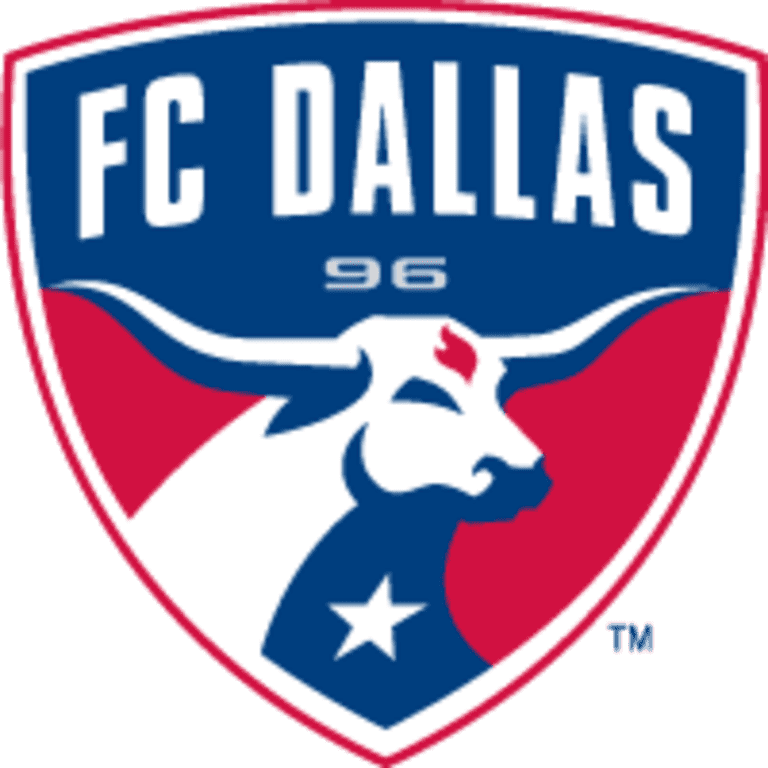
Reggie Cannon
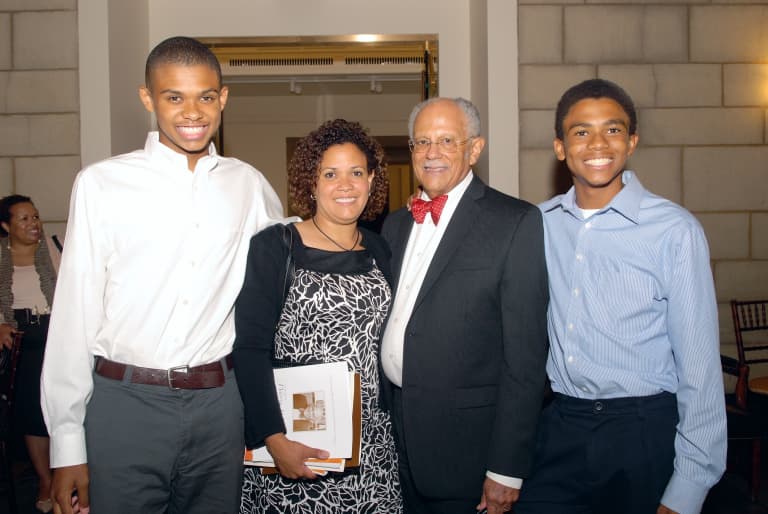
Three generations of Reggie Cannon's family | Courtesy of Dr. Tracy Cannon-Smith
Though he credits his mother Tracy first and foremost, raising Reggie Cannon for success was a group effort, with his father, stepfather and Nobel Prize-winning grandfather all contributing.
"My mom was moreso the harsh one, she would always tell me what to work on," Cannon said with a laugh, while noting the positive influence of his stepdad Victor, who despite being new to soccer provided valuable sporting experience from his career as a gridiron football player at Dartmouth.
"He knew what it took, and he always saw that in me," said Cannon. "He was always pushing me to get to that next level with whatever I wanted to do … it was always him and my dad trying to find new ways to push me and giving me advice."
With a family history of advanced education – mom is a urologist, dad is a radiologist, stepfather works in IT project management and his grandfather is a climate change scientist – Reggie had to do some convincing when he decided to leave UCLA early to sign a Homegrown deal with FC Dallas at age 18. But they saw that he was well-equipped for his chosen profession.
"It was a tough decision because my family is super, super into academics," said Cannon, "but they all supported me in that decision, because they saw the drive in me and they always knew that I never gave up, no matter the circumstances, and it ultimately paid off."













